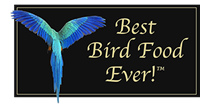Author: Leslie Moran
https://www.bestbirdfoodever.comLeslie is skilled at using food and nutrition to reverse or prevent disease conditions from developing in the first place in parrots and finches. Since 2002 she has been researching the facts and translating the science of nutrition into practical solutions, and easy to use food combinations, for those who care about the health and well-being of the companion birds, parrots and finches, in their homes or their aviary flocks.







Why Bird Seed is Bad for Your Bird?
Did you miss the FACT that BIRDS EAT SEEDS?
Hi Clive,
Thanks for your comment.
Yes, in the wild birds do eat seeds. And, if given the chance our companion and aviary parrots would eat a large assortment of foods that are also unhealthy for them, such as: potato chips, pizza, ice cream, French fries, the list is endless.
It is always amazing that people who know very little about avian nutrition are the ones who seem to start avian feeding trends. As I explain in this video the person who ‘started’ the custom of feeding birds seeds, knew zero about avian nutrition.
In this video I provide you the facts on why dry seeds are void of essential nutrients. It has also been repeatedly documented that dry seeds cause or contribute to a wide range of avian disease conditions. Malnutrition is even being identified as causing genetic disorders that runs the risk of eliminating aviculture breeding stock around the globe. To me, this is truly alarming.
I also realize that many people use the diet of wild birds as a guide when selecting the foods to feed birds in captivity. I disagree with this practice because:
1). We cannot possibly know everything a wild bird eats, and
2). Millions of wild animals (including parrots and finches) die of malnutrition and starvation in the wild, and
3). in the wild birds burn thousands of calories each day — this causes their bodies to respond to foods eaten in a very different way than parrots and finches who sit on perches all day, getting very little exercise.
My nutritional work with parrots and finches is focused on using food as a medicine for preventing illness, reversing disease conditions, increasing longevity and good health, and my most recent research (article series in Parrots magazine fall 2019) indicate where malnutrition also causes aggression and behavior problems. The only way to attain these goals of preventing illness, reversing disease conditions, increasing longevity and good health, that I aspire to, is to feed our birds a combination of foods that provides them balanced nutrition. Feeding the hodgepodge variety of foods that many advise, is the key problem because it lacks all nutritional balance, and is missing hundreds of essential nutrients. I say this from my own personal experiences that I went through when I first started in aviculture. Every single bird of mine that dies I send in for a necropsy — this is the only way to know why a bird died and what killed them. I use this vital information to ensure that no avian death occurred in vain, and to further fine tune my approach to feeding parrots & finches balanced nutrition.
People who are a part of my ‘Healthy Bird Project’ are seeing very good results in a variety of areas. Dry bird seeds (or sprouted random seeds) are not a part of my ‘Balanced Exotic Avian Maintenance Diet Food Plan’. Every food in this balanced food plan has been throughly researched and is fed with a specific purpose behind it.
Also, in this video I explain the two exceptions for feeding dry sees to captive parrots and finches. You may want to rewatch this video and be reminded of this info.
If you have not already done so, please take a look at my 4 part Balanced Food Plan video series. It may answer many of the questions that are arising in your mind.
Here’s a link for your convenience.
https://www.bestbirdfoodever.com/2019/05/balanced-avian-diet-video/
I think for the future of aviculture, and the welfare of the birds we care for, everyone — with an open mind — needs to read the information I’ve a massed, let the facts shed light on dietary nutritional imbalances that exist in common feeding practices and give what I’m suggesting a try. Following the status-quo is not serving the parrots and finches, endangered species, or the people caring for them.
And now with Australia being devastated by wildfires, with estimates of billions of animals dying, we have no idea how Australia’s parrot and finch species will be effected. With this in mind it becomes even more important for aviculturists around the world to access the food combinations they feed the birds under their care, as the survival fate of many exotic parrots and finches may depend on these birds held in captivity receiving balanced exotic avian nutrition.
Good luck with your flock!